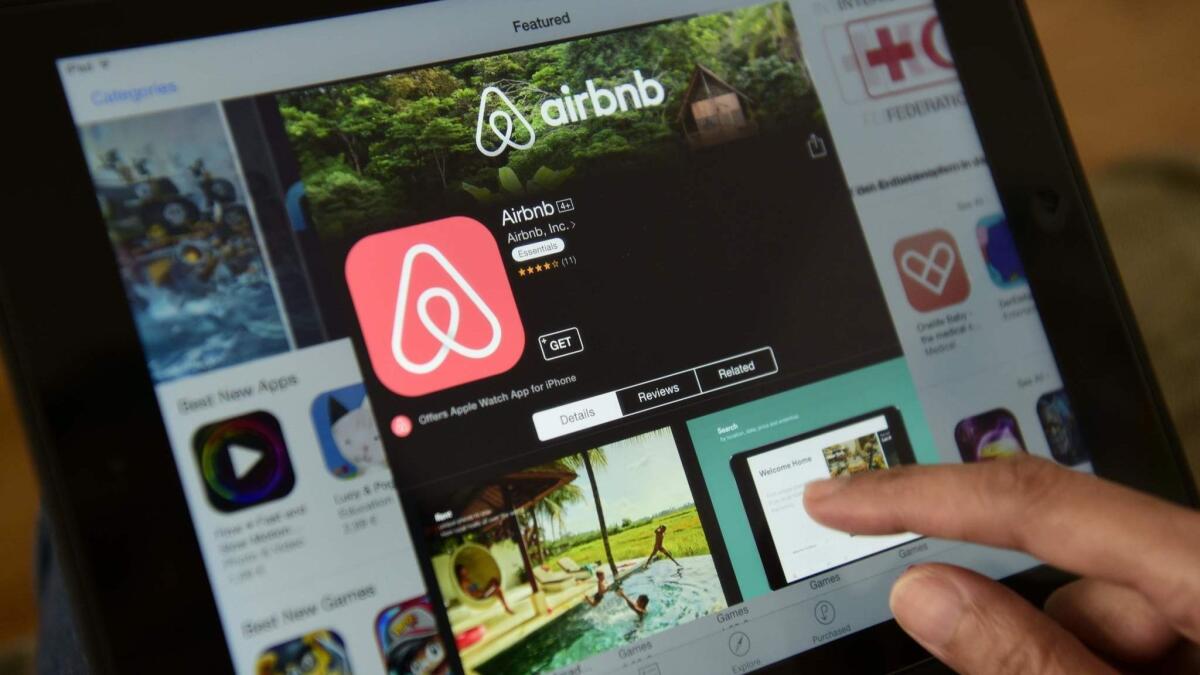Airbnb loses major fight over Santa Monica’s rental law

- Share via
Airbnb Inc. and Expedia Group Inc.’s HomeAway failed to persuade a U.S. court of appeals to strike down a Santa Monica law that makes the companies liable for illicit rentals in the beach city.
The ruling Wednesday by a three-judge panel of the 9th Circuit Court of Appeals is a setback for the home-sharing platforms in their effort to avoid regulation by cities that blame the rapid proliferation of short-term rentals for a shortage of affordable housing and a disintegration of residential communities.
The Santa Monica ordinance holds the companies responsible for booking rentals of residences that aren’t licensed by the city. The appellate panel agreed with the city that the restriction doesn’t violate the U.S. Communications Decency Act of 1996, which shields online services from liability for the content that their users post on their sites.
Airbnb is the largest home-rental platform, with more than 6 million listings around the world. The San Francisco company is gearing up for an initial public stock offering by the end of the year, but it’s still fighting various cities in court over efforts to curtail its operation. In January, Airbnb and other short-term-rental sites won a ruling granting a temporary reprieve from a New York City law that would compel them to turn over renter data, a requirement that threatens to cut their bookings in the city by half.
“Airbnb has seen setbacks like this over the years,” Bloomberg Intelligence analyst Mandeep Singh said. “They will continue to work with the regulators on tax collection and other fees, but it should not have much of an impact on its IPO.”
Airbnb is also fighting Paris, where it faces as much as $14 million in fines for allegedly posting illegal advertisements, and in November it sued Boston over a new ordinance that it says would limit short-term home rentals and impose unfair restrictions and financial penalties on the company.
The courts’ interpretation of the 1996 law and the protection it affords interactive online businesses has become a central theme in legal challenges to Airbnb and its rivals. Federal judges in Los Angeles and San Francisco have found that cities can hold the companies liable for processing transactions, as opposed to simply listing information from users. Yet in a separate case in Los Angeles, a judge concluded that Airbnb can’t be made responsible for renters breaking their leases when they list their apartments on the site.
Airbnb and HomeAway argued that the Santa Monica ordinance makes it impossible for them to operate, particularly if other municipalities adopt similar laws, because it would require them to monitor and remove listings for unregistered residences. If they don’t, users would be stuck looking at listings that they won’t be able to book, according to the companies.
The 9th Circuit panel concluded that Santa Monica’s statute puts only an “incidental” burden on the companies’ constitutional right to free speech.
“Even assuming that the ordinance would lead the platforms to voluntarily remove some advertisements for lawful rentals, there would not be a ‘severe limitation on the public’s access’ to lawful advertisements, especially considering the existence of alternative channels like Craigslist,” the judges said in the ruling.
Airbnb said the Santa Monica case doesn’t reflect the progress it has made working with local governments across the country.
“Airbnb has made great strides around the world, working with dozens of cities to develop more than 500 partnerships including fair, reasonable regulations, tax collection agreements, and data sharing that balance the needs of communities, allow hosts to share their homes in order to pay the bills and provides guests the opportunity to affordably visit places like the California coast,” the company said in a statement.
Expedia said Wednesday’s ruling is out of step with other court decisions and runs contrary to the Communications Decency Act’s protections for innovation on the internet.
Santa Monica said in a statement that the unanimous ruling confirms the city’s right to regulate home sharing to protect its limited housing stock for residents.
“We are thrilled to have confirmation from the 9th Circuit that our balanced approach to home sharing is working at a time when housing and affordability continue to challenge the region,” Mayor Gleam Davis said. “This is a big win for Santa Monica residents and our residential neighborhoods.”
More to Read
Inside the business of entertainment
The Wide Shot brings you news, analysis and insights on everything from streaming wars to production — and what it all means for the future.
You may occasionally receive promotional content from the Los Angeles Times.










